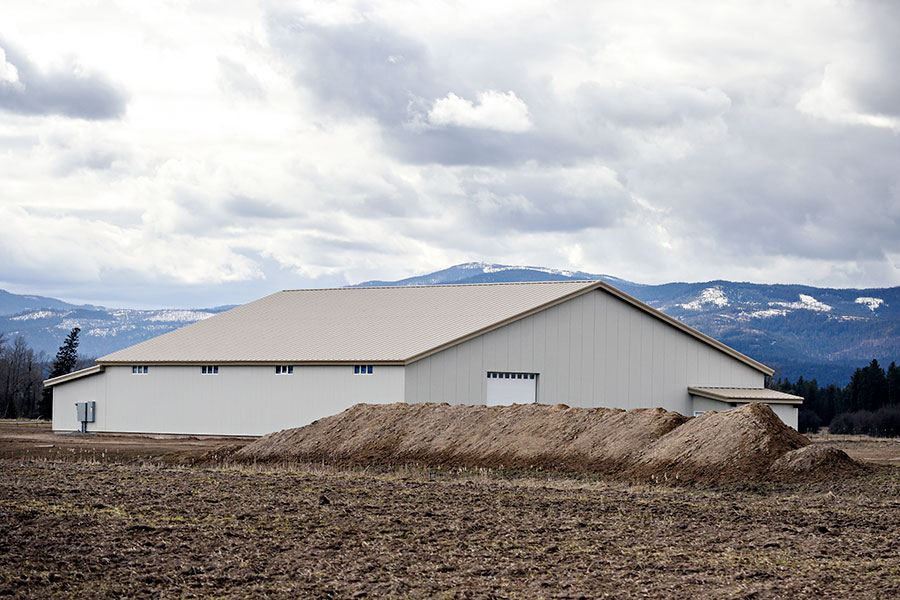A Creston water-bottling facility at the center of a heated dispute among neighboring landowners has launched its production line even as Flathead County investigates a complaint challenging the legality of the plant operating within a voter-approved zoning district.
At the heart of the controversy is the Montana Artesian Water Company, a water-bottling plant started by Egan Slough landowner Lew Weaver. Weaver received a permit with the Department of Natural Resources and Conservation that would allow his company to produce up to 140,000 water bottles per hour, 24 hours a day, seven days a week. The water right would allow Weaver’s company to receive 710 acre feet of water annually, equaling roughly 1.2 billion 20-ounce water bottles.
Neighbors to the proposed bottling facility have publicly raised concerns on multiple fronts, mounting efforts to challenge the facility from beginning production.
In 2016, a group of landowners asked the Flathead County Commission to expand the Egan Slough Zoning District, a designation created in 2002 to preserve the land’s agricultural character. The zoning district prohibits some industrial use and limits new parcels to no less than 80 acres.
Despite hearing testimony from dozens of residents who supported the zoning expansion, the commission rejected their request, prompting the landowners to sue the county and lead a charge to qualify a ballot initiative for the June 5 primary election ballot.
Passing overwhelmingly with 70 percent of the vote, the measure expanded the 1,150-acre Egan Slough Zoning District to include an additional 530 acres. Land added to the district now includes the site of Weaver’s bottling facility, which isn’t in full production but is capable of producing about 30 gallons a minute — a violation of the zoning district’s requirements, according to neighbors who filed a complaint with Flathead County officials.
But Darryl James, a spokesman for Montana Artesian Water Company, said production had begun prior to the certification of the ballot initiative, including the assembly of equipment and the receipt of regulatory permits.
“We had all our substantive permits,” James said. “The water right had been issued. The discharge permit had been issued. It was a completed project to be grandfathered in and not subject to the zoning district.”
Meanwhile, county planning officials are struggling with how to administer the zoning regulations while the Flathead County Attorney’s Office investigates two complaints filed in June.
Flathead County Planning and Zoning Director Mark Mussman said that while the water-bottling facility appears to fit within the definition of a prohibited industrial activity, there are other layers of legal complexity that need to be examined given that Montana Artesian Water Company had completed multiple phases of development prior to the ballot initiative’s passage.
“This particular case is a little bit complicated because there were building permits and buildings built. There were water rights permits applied for and issued and discharge permits applied for and issued, all before the vote on the initiative,” Mussman said. “Right now we’re relying on county legal staff to help us wade through all of this. There are a ton of issues wrapped up in this that we have never encountered before.”
After receiving two complaints from attorneys representing the Egan Slough community, Mussman said county officials made an official site visit and requested additional information from Weaver regarding the company’s status.
But aggrieved property owners say Montana Artesian didn’t start actually bottling water until July, after the zoning district’s expansion had been implemented.
Amy Waller, a representative for Yes! For Flathead Farms and Water, said the voters of Flathead County sent a clear message when they turned out in force to approve the ballot initiative and broaden the zoning district.
“The expanded Egan Slough Zoning District is legal and enforceable, and we strongly disagree that the bottling plant is somehow a legitimate pre-existing use,” Waller wrote in an email. “No water was bottled until following the 70 percent majority vote.”
James said Montana Artesian Water Company and its owner have been through a years-long regulatory process to reach the point the facility is at today.
“We have been going through an exhaustive regulatory review process only to have a political process to stop the project literally race us to the finish line,” James said.
Meanwhile, attorneys for landowners opposed to the bottling facility say the company and its owner knew the risk of moving forward in the face of uncertainty.
“[Montana Artesian Water Company] has always proceeded at its own peril and assumed any risk in pursuing its venture, knowing that a vote on the zoning initiative was forthcoming, and knowing that the final legal status of its water right and discharge permits have yet to be resolved,” according to the complaint.
Describing the company’s status as in the “start-up phase of production,” James said Montana Artesian is working out kinks in the bottling line and is not in full production. The current facility can produce about 30 gallons a minute, which is “not anywhere close to its permitted volume.”
“We will not be producing anywhere close to our permitted volume, which is something we have been emphasizing for years,” James said.
Montana Artesian’s product is available in some local stores, while James said other stores have expressed a reluctance to carry the company’s water due to threats of a boycott from customers. He said the company is trying to distribute outside of Flathead County but not beyond state lines.
As the agency charged with determining all land-use regulations in Flathead County, Mussman said his department will be the one to issue a decision on whether Montana Artesian Water Company’s operation is a violation.
However, a decision in either direction could be challenged in court, he said, and given the interest the bottling plant has generated, he doesn’t expect it to be resolved overnight.
“This is not over by any stretch of the imagination,” Mussman said. “And in terms of the complaint of a violation that we have received, we are waiting on additional information that will be reviewed carefully by county legal staff.”
